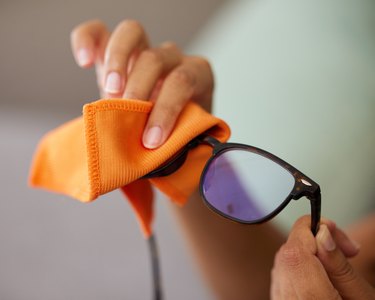
People with perfect vision just don't realize how lucky they have it. For people who wear eyeglasses, dealing with smudges is a daily hassle. Every time you put them on, adjust them or take them off, there's a chance you'll accidentally brush the lenses and create a noticeable smudge that impedes your ability to see clearly. Every time you try to get rid of those smudges, you risk scratching the lenses and making the problem even worse. Knowing how to get rid of those marks without permanently scratching the lenses is essential for anyone who wears glasses.
How to Clean Smudged Eyeglasses
Video of the Day
There are a few simple but effective ways to remove smudges without damaging glasses. The first step is always to wash your hands thoroughly. Smudges are often created by the oils and dirt on your fingers, so it's obviously best to use clean hands to clean dirty eyeglasses.
Video of the Day
Simply washing the glasses with soap and water is the best option for cleaning and disinfecting eyeglasses. Use warm water and liquid soap without moisturizer, such as dish soap. Plain hand soap is also fine, but don't use hand soaps that have exfoliating beads, shea butter, essential oils or other additives; they can leave behind a greasy film or create scratches that become permanent smudges on glasses. Cleaning glasses with soap and water is ideal because it allows you to remove any dirt or bacteria from your frames as well as from the lenses themselves. When you don't have access to a sink, spritzing both sides of the lenses with eyeglass cleaner is obviously another safe way to clean smudges.
Whether you use eyeglass cleaner or soap and water to clean smudged lenses, the most important step is using the right material to dry them. Many people carry around a microfiber cloth for eyeglasses to quickly wipe away smudges throughout the day. It's the best material for drying wet lenses. Holding the glasses by the frames, use a microfiber cloth to gently dry both sides of the lenses. If you still have a permanent smudge on glasses after cleaning them properly, it may be time to replace them with a new pair.
DIY Eyeglass Cleaner
If you don't have any commercially made eyeglass cleaner on hand, there's a simple DIY option: rubbing alcohol. Make your own bottle of eyeglass cleaner by filling a spray bottle about 3/4 full with rubbing alcohol. Add a few drops of dish soap and fill the bottle the rest of the way with water. Keep the bottle in a bag with a microfiber cloth for eyeglasses and stash the bag at your desk or in your car so you can deal with smudges quickly when you're not near a sink. Shake the solution before spritzing it on glasses.
Don't use eyeglass cleaner if your lenses have been treated with any special coatings, like anti-glare or scratch-resistant coating. Rubbing alcohol (or commercial cleaners) can damage these substances. Washing with soap and water is best for coated glasses.
How Not to Clean Smudged Eyeglasses
Using the wrong products to clean them can actually create a permanent smudge on glasses. Don't clean glasses by breathing on them and then wiping them on your shirt or other clothing; it's unhygienic and may scratch or smudge the lenses further. Don't use any of the cleaners you would use to clean mirrors or windows on your eyeglasses, like vinegar or commercial glass cleaner. Never clean glasses by wiping the lenses with paper towel, tissue or other paper products. They may scratch lenses and leave lint behind.